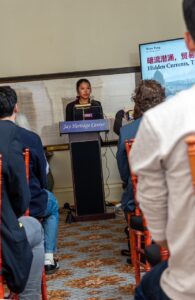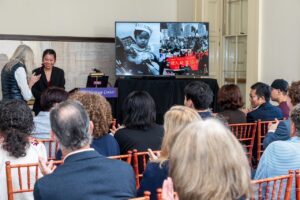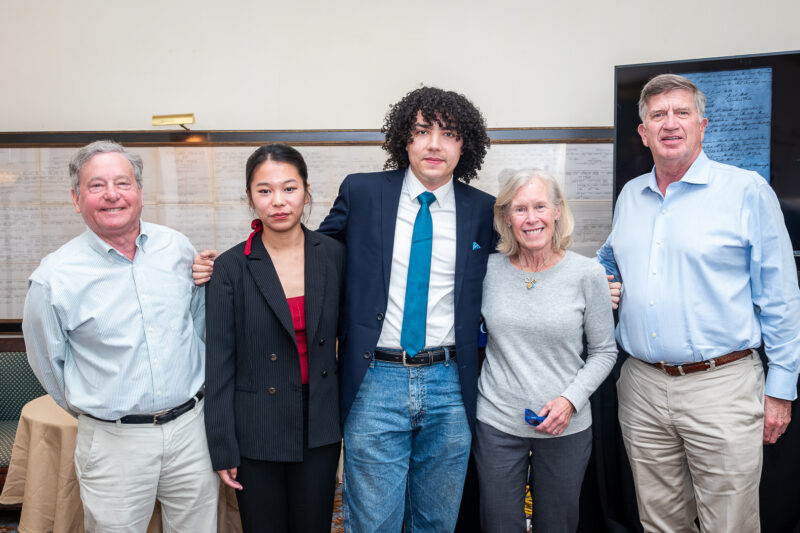 The second O’Neill Fellowship Presentation was held on October 6, 2024 and featured presentations by Wena Teng and Zachary Vanderslice, both seniors at Columbia College. In her introductory comments, JHC President, Suzanne Clary explained how the fellowship was established in 2022 in memory of Margaret “Maggie” Nolan O’Neill (Columbia College Class of 2021) by family and friends to advance scholarship in American history and geopolitics while also fostering respectful dialogue of topics relevant to the evolution of our nation, the shaping of its democracy and place in the global arena. The fellowship allows one or more undergraduate or graduate students at Columbia University to use the JHC campus, archives and advisors as resources and includes a stipend for an immersive summer experience. The selected fellows are then invited to present their final research to the public in a fall program.
The second O’Neill Fellowship Presentation was held on October 6, 2024 and featured presentations by Wena Teng and Zachary Vanderslice, both seniors at Columbia College. In her introductory comments, JHC President, Suzanne Clary explained how the fellowship was established in 2022 in memory of Margaret “Maggie” Nolan O’Neill (Columbia College Class of 2021) by family and friends to advance scholarship in American history and geopolitics while also fostering respectful dialogue of topics relevant to the evolution of our nation, the shaping of its democracy and place in the global arena. The fellowship allows one or more undergraduate or graduate students at Columbia University to use the JHC campus, archives and advisors as resources and includes a stipend for an immersive summer experience. The selected fellows are then invited to present their final research to the public in a fall program.
Clary added that it had been a pleasure for the JHC Board and staff to work with these students and expressed JHC’s gratitude to the O’Neill Family and supporters of the fellowship. She also thanked Michael Gately, Assistant Director of the Center for American Studies at Columbia for his part in administering the review of many qualified applicants. The audience heard comments from JHC’s inaugural O’Neill Fellow, Fenway Donegan, who revealed how the 3-month academic residency afforded him invaluable research and management skills, even leading to a staff position in Albany with NY State Assemblyman Steve Otis.
In beginning her research, Wena first examined John Jay’s interest in propelling commerce with China to bolster both independence and economic prosperity comparing it with his other political stances including abolition efforts. As she refined her work, she focused on the racialized origins of US-China trade policy during the Early Republic, Civil War, and post 1965 Hart-Celler Act. She analyzed the inevitable events and ripple effects of immigration undergirding trade and the impacts on migrant workers in ethnic labor communities post-Civil War to the 21st century. Her talk highlighted the self-sufficiency of immigrants and the history of policies affecting the lives of immigrants and workers.
Zachary’s process focused on early free Black community formation in New York during the gradual emancipation era (1799-1827) following John Jay’s signing of the Gradual Emancipation Act into law. Zachary’s research explored how free and enslaved Black New Yorkers experienced this period of change: the ever-present fear of re-enslavement, the formation of community organizations, and the growing access to education. In particular, he highlighted John Jay’s nephew Peter Jay Munro’s defense of many free Black individuals whose new rights were challenged. Drawing from primary documents from the Manumission Society, Zachary shared a few vignettes from the lives of Black New Yorkers, presenting a realistic, both hopeful and somber, portrait of this important moment of transformation.
Photos by Kim Crichlow

